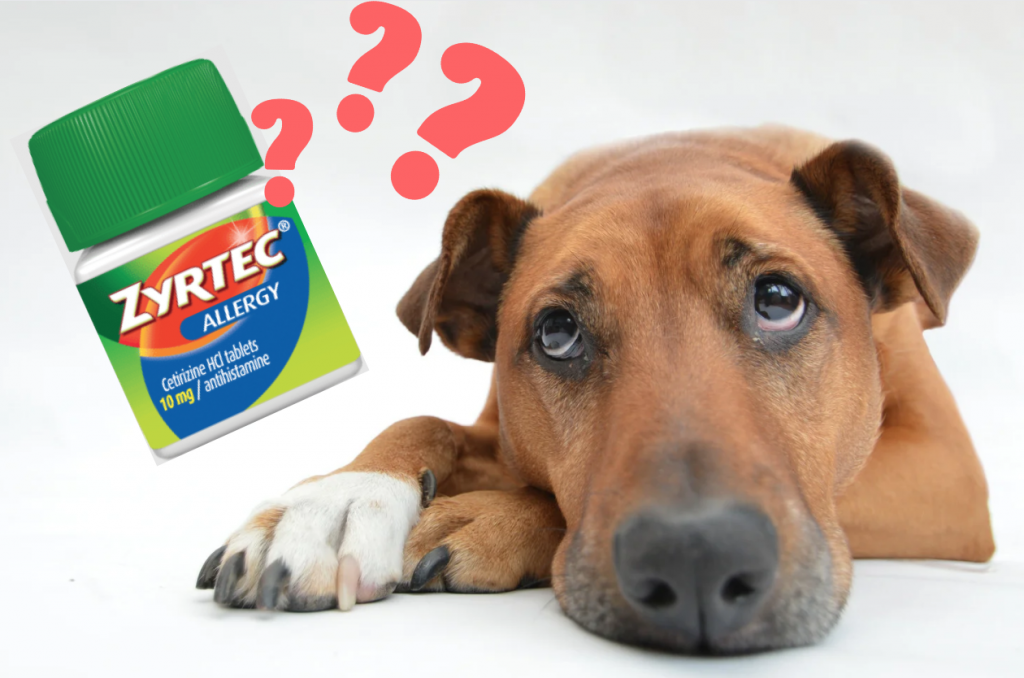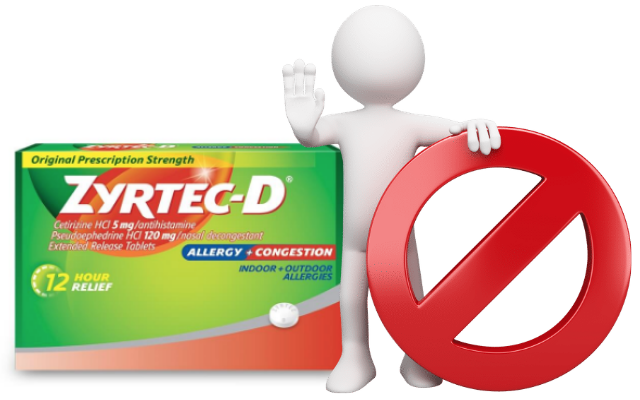Can Dogs Take Zyrtec?

Does your dog have allergies? If they do, my condolences. It’s not easy to have an itchy, allergic dog.
Some common symptoms of allergies include excessive reverse sneezing in dogs, sniffling, itchy eyes, itchy skin, obsessive foot licking, and discharge from the nose and eyes. Some people have been told that reverse sneezing does go away on its own, but reverse sneezing in dogs with allergies rarely corrects itself.
As pet parents, we want to ease their discomfort, so they can play on the grass without a reaction, or to minimize the constant paw licking. But, what can you do to minimize these allergies?
One of the most popular allergy medications on the market right now is Zyrtec. But can dogs take Zyrtec?
Keep scrolling to learn the answer!
What is Zyrtec?

Zyrtec is an over-the-counter allergy medicine available as a pill or a liquid. Both forms contain the same key ingredients and work the same way. The primary active ingredient in Zyrtec is cetirizine.
Zyrtec is classified as an antihistamine, and it works by blocking the chemicals responsible for an allergic reaction.
If you’re like most responsible dog owners, you’re probably wondering: is Zyrtec dangerous for dogs? Is it safe to administer Zyrtec at home, away from a vet? Luckily, Zyrtec is considered one of the safest over-the-counter medications to give your dog, and has a wide margin of error so it’s very difficult to mess up and give your pup too much.
Why Would Dogs Take Zyrtec?
Dogs may be prescribed Zyrtec for allergic reactions and itchy skin. Dogs with a history of severe skin reactions to allergens are commonly given Zyrtec. Skin reactions—such as urticaria (hives) and pruritus (itchy skin)—and atopic dermatitis are the most common targets of Zyrtec treatment in dogs.
How is Zyrtec Administered?
Zyrtec comes in pill and liquid form. Depending on your pet’s disposition and interest in food, one may be easier than the other. Pill pockets or treats with pills hidden inside are typically the easiest methods of administering medication of any kind.

Be aware that Zyrtec, like other medications, may cause an upset stomach. For this reason, it’s best to give your dog their medication at the same time as you feed them. Many people even add their dogs’ medication to their dinner – just be sure they get every last bite.
Is Zyrtec Safe for Dogs?
Zyrtec is safe for dogs, but owners should consult with their veterinarian before giving any kind of medication to their pups. Your vet can recommend the correct dosage and advise you on whether or not there are better options available for your dog. After all, every dog is different! Some dogs may not get much relief from Zyrtec, and it is not recommended for all dogs.
How Much Zyrtec Can a Dog Have?
Dog owners are recommended to give their dogs Zyrtec twice daily for allergy symptoms, dosing according to the size of their dog. Here are some general guidelines for how much Zyrtec to give your dog based on weight, but be sure to consult with your vet first.
| Dog Weight (in pounds) | Zyrtec Dose (in milligrams) |
| < 10 lbs | 5 mg |
| 15–50 lbs | 10 mg |
| 55–100 lbs | 20 mg |
How much Zyrtec can I give my 100-pound dog?
A 100-pound dog can take 15–20 mg of Zyrtec.
How much Zyrtec can I give my 90-pound dog?
A 90-pound dog can take 15–20 mg of Zyrtec.
How much Zyrtec can I give my 70-pound dog?
A 90-pound dog can take 15–20 mg of Zyrtec.
See also Buying This Everyday Item Could Land Your Dog in the ER
What are the Side Effects of Zyrtec in Dogs?
Zyrtec is classified as a second-generation allergy medication, which means it is carefully formulated without the ingredients that cause drowsiness in first-general allergy medication. This means that it was formulated to avoid causing drowsiness. Because of this, Zyrtec has a low potential for side effects, but you may still notice some drowsiness or excessive drooling.
Because all dogs are different, it’s still possible for a pup to suffer from mild to severe side effects after taking Zyrtec. If any of these side effects appear, you should immediately stop providing Zyrtec and call your veterinarian. Some of the more serious side effects are:
- Constipation
- Hyperactivity
- Lethargy
- Urine retention
- Vomiting and intestinal upset
Which Dogs Should Not Take Zyrtec?

Some pups are more likely to develop side effects or have severe reactions to Zyrtec, usually because of an underlying medical condition. Because of this, it is vital that you consult with a veterinarian before giving your dog any medication. Dogs with these conditions, in particular, may not be good candidates for Zyrtec:
- Chronic heart, liver, or kidney issues
- Prostate problems
- Puppies and nursing dogs
- Seizure disorders
- Thyroid problems
- Trouble urinating or constipation
Zyrtec should never be given to dogs who fit the following criteria without first consulting with your trusted veterinarian:
- Dogs currently taking any other medications
- Dogs with a history of allergic reactions to antihistamines
- Service dogs
- Working dogs (due to drowsiness)
What Drugs Does Zyrtec Interact With?
Because of the potential for serious side effects, you should contact your veterinarian before providing Zyrtec to dogs on any kind of medication. This will ensure that you are not putting your dog at risk.
See also The Best Dog Supplements for Skin & Coat Available on Amazon

There are, however, some kinds of medications that are more likely to cause severe side effects when taken with Zyrtec. These drugs include:
- Anti-anxiety medication
- Blood pressure medication
- Heart medication
- Muscle relaxants
- Opioids and painkillers
- Other anti-allergy medications
Is Zyrtec-D Safe for Dogs?

Zyrtec-D is not safe for dogs! It is also unsafe for cats. overstimulates their nervous system. This can result in heart failure and seizures, both of which are serious and may lead to death.
Zyrtec-D’s secondary active ingredient, pseudoephedrine, overstimulates the canine nervous system and can result in heart failure and seizures, both of which are serious and may lead to death. In humans, this chemical is known to relieve allergies and congestion, but it is an absolute NO for our four-legged friends.
Can Dogs Take Zyrtec: The FAQ
To help you make your final decision on whether or not to give your pup some Zyrtec this summer, we’ve compiled a list of some of the most common questions about this drug.
Keep scrolling to learn more about this anti-allergy medication!
Zyrtec should not be given with another antihistamine unless specifically recommended by your veterinarian.
However, dogs can take Claritin separately. Consult with your veterinarian to determine which could be better for your pup.
According to Veterinary Doctor Nichole Hirsch, who specializes in dermatological conditions, it is safe to administer Apoquel and Zyrtec together.
As with any medicine, you’ll need to consult with your veterinarian to determine if Apoquel is right for your pup. Unlike Zyrtec, Apoquel was specially formulated for pets, and it may work better than other antihistamines.
See also Why Is My Dog Peeing In Their Sleep?
Benadryl should never be combined with any other medications!
Benadryl is a first-generation allergy medication. This means that it is more likely to cause side effects, such as drowsiness and drooling. Dry eyes and mouth are other possible side effects. Because of this, it’s probably better to give your pup some Zyrtec.
But, will Benadryl help reverse sneezing in dogs? Yes–like Zyrtec, Benadryl is a great treatment option for excessive reverse sneezing.
Zyrtec should never be given alongside another allergy medication unless specifically recommended by your veterinarian.
Like Zyrtec, Allegra is a second-generation allergy medication. To know which is better for your pup, consult with your veterinarian.
Zyrtec can be provided daily if needed. However, to determine the proper dosage and instructions, you should always speak with your veterinarian.
Yes! Itchiness is one of the primary reasons for dogs to start taking Zyrtec. The medication is particularly helpful for dogs with allergic skin reactions.
The Bottom Line
As with any medication, you need to contact your veterinarian before you start providing Zyrtec to your pet. Discuss your options, and be sure to ask if your vet has better recommendations. There are plenty of allergy medications on the market, and not all of them will work for your dog.

To stay up to date with all of the latest news and learn new facts about taking care of your pup, be sure to keep tabs on our blog!



